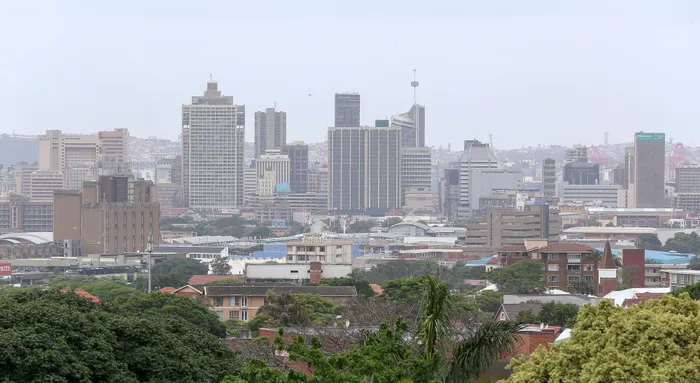KZN's air quality monitoring stations not operational for two years: What it means for residents

The Durban landscape. Concerns have been raised about the air quality in KwaZulu-Natal as air quality monitoring stations have not been working for two years.
Image: Leon Lestrade Independent Newspapers
There are concerns about the state of air quality in KwaZulu-Natal following revelations that air quality monitoring stations in the province are not working. KwaZulu-Natal has six air quality monitoring stations under the Department of Economic Development, Tourism and Environmental Affairs (Edtea), and they have not been operational for the past two years.
Environmentalists and members of the environmental affairs committee have expressed their concerns, warning that the lack of operational monitoring means the air quality in this province is unknown, which poses significant health risks. The matter was raised in the Environmental Affairs Committee recently.
DA spokesperson for Edtea, Hannah Lidgett, stated that they had written to the department regarding the ongoing issues with the monitoring stations.
“When stations are not working, you can't monitor air quality adequately in areas that are pollution hotspots. This is especially important where there are communities in close proximity to areas with problematic air quality, because communities rely on access to real-time air quality data to respond to pollution-related health risks,” she said.
Lidgett mentioned that the party has submitted written parliamentary questions to Edtea, demanding detailed information regarding the province's six air quality monitoring stations, which have now been non-operational for more than two years.
She said this move follows a recent Edtea portfolio committee meeting where it was established that the department has allegedly been forced to rely on alternative data sources in areas where air pollution is a known public health risk.
“KZN is home to several industrial zones known for emitting pollutants that pose severe health risks to residents. This includes the South Durban Industrial Basin, uMkomaas, the Tongaat area, and the Richards Bay Industrial Hub.
“The DA is particularly concerned about the absence of real-time air quality data in areas where air quality is already compromised. These communities rely on accurate and timely reporting to respond and protect themselves from excessive air pollution,” she added.
Rico Euripidou, an environmental health campaigner at groundWork, Friends of the Earth South Africa, stated that this was a serious issue. He added that over the years, they have maintained oversight over the handling of air quality monitoring in the province's major municipalities.
“There have been several key issues over the years that we have highlighted, and what we are experiencing now is not new. At one stage in the early to mid2000s, Durban had a world-class air quality monitoring system that was electronically feeding results onto a real-time dashboard available to the public,” he said, noting that this system was allowed to collapse.
Health concerns
“Our government (at all levels) has a duty to fulfil its obligations under the Air Quality Act to monitor air quality and regulate polluting industries.
“Without collecting accurate air quality data, we cannot meaningfully protect public health and mitigate climate change. Air pollution and climate change are two sides of the same coin. We need improved air quality monitoring and more effective environmental governance in Durban to safeguard the health and well-being of its residents,” he added.
“Our government (at all levels) has a duty to fulfil its obligations under the Air Quality Act to monitor air quality and regulate polluting industries.
“Without collecting accurate air quality data, we cannot meaningfully protect public health and mitigate climate change. Air pollution and climate change are two sides of the same coin. We need improved air quality monitoring and more effective environmental governance in Durban to safeguard the health and well-being of its residents,” he added.
The Mercury reached out to the department, which asked for questions and had not responded by publication.
Chairperson of the Committee on Environmental Affairs, Bongi SitholeMoloi, confirmed they had been briefed on the matter.
“All the air monitoring stations are not working, and we have asked the department to fix them. The fact that the stations are not working raises concerns because we do not know whether the quality of the air that people are breathing is still at the required level.”
Related Topics:
